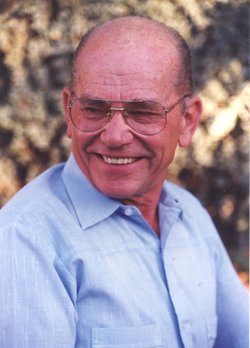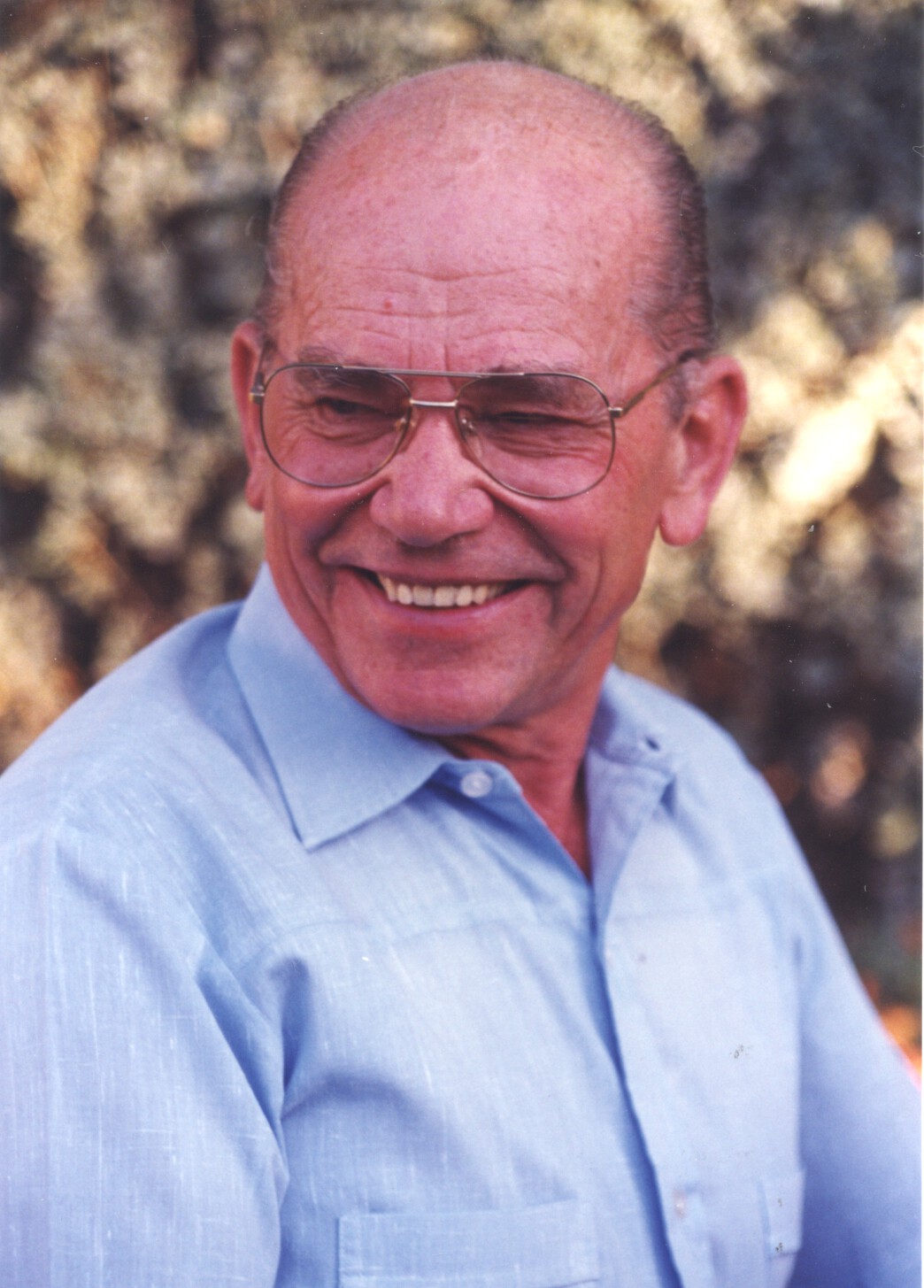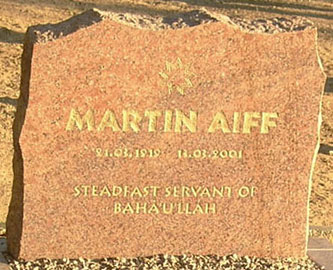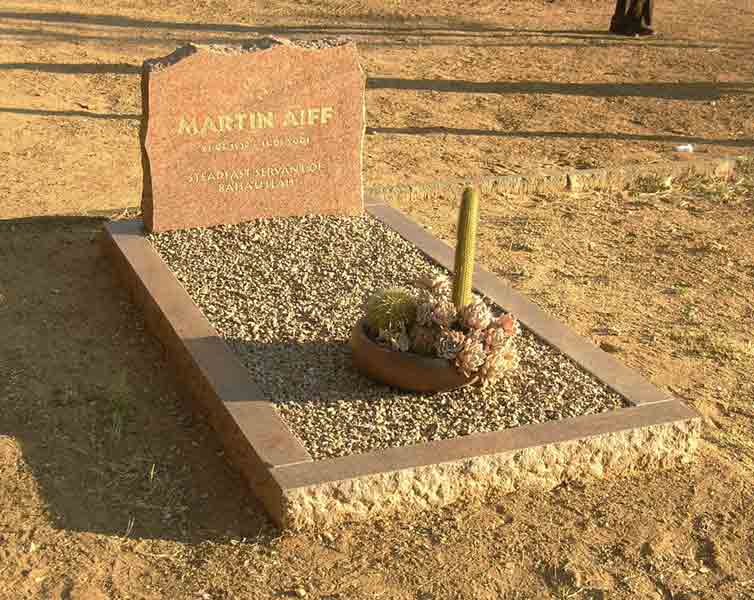Martin Aiff was born on 21 March 1919 on the outskirts of Darmstadt, Germany and raised in a family of independent thinkers. His mother and father were both ahead of their times, who broke out of the norms and expectations of society. His education took place in a village school and after matriculation he trained as a bank clerk, but was unable to apply this learning as he was drafted into the army. He served as a signal man in a combating tank unit throughout the war in several European countries, but mostly in Northern Africa under General Marshal Rommel. At the end of the war, he was fortunate to escape from prison camp and make his way back home to Germany.
Returning home in 1945, Martin, like many others of his generation, was quite disillusioned about life and what the future seemed to hold. He embarked on a fervent search that would offer solutions to the many ills of society which he had witnessed firsthand. He participated in many discussion groups including those on the Bahá'í Faith. Initially he was very critical of the teachings and as he himself admitted he wanted to prove those "hopeless idealists wrong". At the same time, he realized deep in his heart that it was the truth, and with the loving guidance and patience of Dr. Hermann Grossmann, he attended many firesides, and embraced the Faith after a few months of investigation in 1946. He was whole heartedly committed to teaching his new found Faith and supporting the activities of this young community.
In December 1945 Gerda Hartmann, a refugee from Eastern Germany, was assigned by the authorities to live in the Aiff household, and was introduced to the Faith by Martin. Their separate yet common search for the truth brought them together and they got married in March 1948 – one of the first Bahá'í marriages after the war. Serving the Faith became the primary purpose of their lives. They endeavoured to live according to the following statement from Shoghi Effendi (on Dynamics of Prayer) which they chose as the guiding principle for their marriage: "Act: Act as though it had all been answered. Then act with tireless, ceaseless energy. And as you act, you, yourself, will become a magnet, which will attract more power to your being, until you become an unobstructed channel for the Divine power to flow through you."
Martin served the Faith in various capacities in Germany, e.g. he was a member of the National Youth Committee and later also of the National Teaching Committee. In parallel, he started his own printing company, printing many Bahá'í documents and produced a regular 19 Day Bahá'í newsletter. From 1952 – 1959, he and Gerda were caretakers at the National Hazira'tul'Quds in Frankfurt/Main. It was a hub of activities with many friends, including several Hands of the Cause stopping over. One of the many visitors to the Centre was Jessie Revell who was sent to Germany by Shoghi Effendi to encourage the German friends to come on pilgrimage, as this was a good time. Martin and Gerda felt that there were many others that were more deserving of this privilege – at that time they already had five children, and also considered themselves very young in the Faith. Jessie convinced them that these were no valid reasons and eventually, Martin and Gerda were able to go on pilgrimage at the end of January 1957.
The pilgrimage was very significant, with only four pilgrims from the West attending. At that time, the pilgrims stayed at the Western Pilgrim House and had the privilege of dining every evening with Shoghi Effendi, Amatu'l Baha Ruhiyyih Khanum and other members of the World Centre community, e.g. Mr. and Mrs. Ioas, Dr. Lutfullah Hakim and the Revell sisters. Several times the beloved Guardian told Martin and Gerda verbally: "There are no German pioneers yet in Africa; the German youth shall go to Africa." During one of the dinners, after asking Martin where he had served in the army and whether he was a Bahá'í at that time, the Guardian stated that they should lead the German youth to Africa. According to Ruhiyyih Khanum, Shoghi Effendi was pleased that Martin and Gerda understood the call to pioneer to Africa and advised them to contact the four existing Regional Spiritual Boards of Africa to determine which country they would pioneer to.
In April 1957, Martin was elected to the National Spiritual Assembly of Germany and served as its secretary until the family left for their pioneering post in 1959. He was directly involved in the planning of the following:
- One of the International Conferences for the mid-term of the Ten Year Crusade called by Shoghi Effendi and held in Frankfurt/Main in July 1958.
- The acquisition of the property for the Bahá'í House of Worship in Langenhain, Germany.
After the sudden passing of Shoghi Effendi in November 1957, all further communication and guidance was with the Hands of the Cause residing in the Holy Land. It was decided to adopt South West Africa (now Namibia) as their pioneering post, as the Knight of Baha'u'llah, Ted Cardell and his wife Alicia, had to leave the country and it used to be a Germany colony. In a letter dated 25 January 1959, the Hands of the Cause in the Holy Land wrote: "We assure you that our loving prayers are offered for the pioneer undertaking of your dear family in Africa, which will introduce into that continent representatives of the German believers and thus fulfil one of the hopes of our beloved Guardian."
The Hands of the Cause in Africa confirmed that Shoghi Effendi "had made it very clear that in Africa the purpose of the pioneers is to teach the native people."
Martin and Gerda, together with their six children arrived at their pioneering post in South West Africa on 5 July 1959. Here they were faced with many challenges during the apartheid era. Whilst remaining obedient to the government of the day, i.e. not opposing it directly even though the Bahá'í teachings did not agree with the politics of the country, the Faith was constantly taught to seeking souls.
In its condolence message to the family, the National Spiritual Assembly of Namibia stated "Can those of us outside your dear family ever imagine what it was like to live for so many years in circumstances which required such vigilance, care and caution in case a casual remark about the Baha'I Faith or the unity of mankind aroused the suspicion of the authorities and the consequent expulsion of one's family from this country as happened to others? Can we ever imagine what it was like to hold Bahá'í meetings in secrecy and under the cover of darkness in whispers? To have to hold a Bahá'í meeting in a cave in the bush? Can we imagine the faith and effort it took to endeavour at the same time to raise six mentally and spiritually healthy and happy children under these extreme circumstances?"
"Martin's constant hard work, high standards and vision are well known to this community. The acquisition and the development of the National Bahá'í Centre had much to do with the labours of Martin and Gerda. By their example they showed those who knew them how to get by with little, how to recycle what would appear to others in need of discard, and how to sacrifice and take risks. Martin persevered in every way he knew to deepen the devotion and spiritual understanding of the Bahá'ís around Namibia, working to establish Local Spiritual Assemblies and the activities that surround them."
In 1967, at the request of the National Spiritual Assembly for the friends to disperse because there were five pioneers in the capital city, the family moved to the small coastal town of Luederitzbucht as home front pioneers. Among the outstanding memories of this period were visits by Amatu'l-Baha Ruhiyyih Khanum and Mrs. Violette Nakhjavani, and the Hand of the Cause of God, Dr. Adelbert Muehlschlegel and his wife Ursula, and Counsellor Shidan Fathe-Aazam.
When Martin and Gerda returned to Windhoek in 1973, they were faced with many challenges as most of the other pioneers had left the country. They continued to persevere in the teaching work, and gradually travel teachers and other pioneers came. The National Centre was developed during these years. Hand of the Cause of God, Dr. Rahmatu'llah Muhajir visited the country in December 1977 and encouraged Martin and Gerda to visit the ‘homelands'. Up until that time, it had not been possible for the Bahá'ís to travel to Ovamboland. They were finally able to obtain a permit and visited this part of the country for the first time in 1978 – upon entering the homeland, Martin was moved to tears. This was the beginning of many subsequent visits to the friends in the rural areas and villages.
Throughout his life, Martin sought employment that would bring him in touch with people. In his early 70s, he and Gerda home front pioneered to Tsumeb, where they established an Arts and Crafts Centre. The Centre was a private socio-economic development project, enabling rural people to earn a living through different skills, e.g. brick and fence making, basket weaving and candle making. Further projects – Kavango wood works and a gardening project in Ndorika in Northern Namibia, were initiated through the Centre. This brought the people from the rural areas in touch with the Faith. Amongst friends, as well as colleagues and business associates, he was known for his trustworthiness, reliability and honesty.
Among Martin's services and achievements he will be remembered for the following:
- Organizing the translation, publication and printing of Bahá'í materials into local languages
- Member of the National Spiritual Assembly of South and West Africa from 1973 - 1974
- Member of the National Spiritual Assembly of South West Africa/Namibia from its inception in 1981 until 1986
- Auxiliary Board member for Propagation & Protection from 1986 – 1996
- The establishment of a regular newsletter for the assistants
Due to his unfailing dedication, commitment and perseverance, he had the joy of seeing the Faith grow in membership to over 2,000 Bahá'ís at his pioneering post. During his 42 years in Namibia, Martin made many acquaintances and friends at all levels of society with equal ease. He was forthright and you always knew where you stood with him, yet uncompromising when it came to principles of the Faith, with complete reliance and obedience to the institutions for guidance.
After a prolonged illness, Martin passed away in his pioneering post on 13 March 2001. He was survived by his wife Gerda, six children, twelve grandchildren and two great grandchildren. Gerda's devoted and continuous support during their fifty-three years of marriage enabled him to realise his dreams and aspirations. It warmed his heart to witness his children, including the grandchildren, active in the Faith.
"His staunch faith, his many years of dedicated service and his steadfastness in remaining at his pioneering post in Namibia in excess of forty years will serve as shining examples of devotion for generations to come." (The Universal House of Justice)
Martin Aiff was born on 21 March 1919 on the outskirts of Darmstadt, Germany and raised in a family of independent thinkers. His mother and father were both ahead of their times, who broke out of the norms and expectations of society. His education took place in a village school and after matriculation he trained as a bank clerk, but was unable to apply this learning as he was drafted into the army. He served as a signal man in a combating tank unit throughout the war in several European countries, but mostly in Northern Africa under General Marshal Rommel. At the end of the war, he was fortunate to escape from prison camp and make his way back home to Germany.
Returning home in 1945, Martin, like many others of his generation, was quite disillusioned about life and what the future seemed to hold. He embarked on a fervent search that would offer solutions to the many ills of society which he had witnessed firsthand. He participated in many discussion groups including those on the Bahá'í Faith. Initially he was very critical of the teachings and as he himself admitted he wanted to prove those "hopeless idealists wrong". At the same time, he realized deep in his heart that it was the truth, and with the loving guidance and patience of Dr. Hermann Grossmann, he attended many firesides, and embraced the Faith after a few months of investigation in 1946. He was whole heartedly committed to teaching his new found Faith and supporting the activities of this young community.
In December 1945 Gerda Hartmann, a refugee from Eastern Germany, was assigned by the authorities to live in the Aiff household, and was introduced to the Faith by Martin. Their separate yet common search for the truth brought them together and they got married in March 1948 – one of the first Bahá'í marriages after the war. Serving the Faith became the primary purpose of their lives. They endeavoured to live according to the following statement from Shoghi Effendi (on Dynamics of Prayer) which they chose as the guiding principle for their marriage: "Act: Act as though it had all been answered. Then act with tireless, ceaseless energy. And as you act, you, yourself, will become a magnet, which will attract more power to your being, until you become an unobstructed channel for the Divine power to flow through you."
Martin served the Faith in various capacities in Germany, e.g. he was a member of the National Youth Committee and later also of the National Teaching Committee. In parallel, he started his own printing company, printing many Bahá'í documents and produced a regular 19 Day Bahá'í newsletter. From 1952 – 1959, he and Gerda were caretakers at the National Hazira'tul'Quds in Frankfurt/Main. It was a hub of activities with many friends, including several Hands of the Cause stopping over. One of the many visitors to the Centre was Jessie Revell who was sent to Germany by Shoghi Effendi to encourage the German friends to come on pilgrimage, as this was a good time. Martin and Gerda felt that there were many others that were more deserving of this privilege – at that time they already had five children, and also considered themselves very young in the Faith. Jessie convinced them that these were no valid reasons and eventually, Martin and Gerda were able to go on pilgrimage at the end of January 1957.
The pilgrimage was very significant, with only four pilgrims from the West attending. At that time, the pilgrims stayed at the Western Pilgrim House and had the privilege of dining every evening with Shoghi Effendi, Amatu'l Baha Ruhiyyih Khanum and other members of the World Centre community, e.g. Mr. and Mrs. Ioas, Dr. Lutfullah Hakim and the Revell sisters. Several times the beloved Guardian told Martin and Gerda verbally: "There are no German pioneers yet in Africa; the German youth shall go to Africa." During one of the dinners, after asking Martin where he had served in the army and whether he was a Bahá'í at that time, the Guardian stated that they should lead the German youth to Africa. According to Ruhiyyih Khanum, Shoghi Effendi was pleased that Martin and Gerda understood the call to pioneer to Africa and advised them to contact the four existing Regional Spiritual Boards of Africa to determine which country they would pioneer to.
In April 1957, Martin was elected to the National Spiritual Assembly of Germany and served as its secretary until the family left for their pioneering post in 1959. He was directly involved in the planning of the following:
- One of the International Conferences for the mid-term of the Ten Year Crusade called by Shoghi Effendi and held in Frankfurt/Main in July 1958.
- The acquisition of the property for the Bahá'í House of Worship in Langenhain, Germany.
After the sudden passing of Shoghi Effendi in November 1957, all further communication and guidance was with the Hands of the Cause residing in the Holy Land. It was decided to adopt South West Africa (now Namibia) as their pioneering post, as the Knight of Baha'u'llah, Ted Cardell and his wife Alicia, had to leave the country and it used to be a Germany colony. In a letter dated 25 January 1959, the Hands of the Cause in the Holy Land wrote: "We assure you that our loving prayers are offered for the pioneer undertaking of your dear family in Africa, which will introduce into that continent representatives of the German believers and thus fulfil one of the hopes of our beloved Guardian."
The Hands of the Cause in Africa confirmed that Shoghi Effendi "had made it very clear that in Africa the purpose of the pioneers is to teach the native people."
Martin and Gerda, together with their six children arrived at their pioneering post in South West Africa on 5 July 1959. Here they were faced with many challenges during the apartheid era. Whilst remaining obedient to the government of the day, i.e. not opposing it directly even though the Bahá'í teachings did not agree with the politics of the country, the Faith was constantly taught to seeking souls.
In its condolence message to the family, the National Spiritual Assembly of Namibia stated "Can those of us outside your dear family ever imagine what it was like to live for so many years in circumstances which required such vigilance, care and caution in case a casual remark about the Baha'I Faith or the unity of mankind aroused the suspicion of the authorities and the consequent expulsion of one's family from this country as happened to others? Can we ever imagine what it was like to hold Bahá'í meetings in secrecy and under the cover of darkness in whispers? To have to hold a Bahá'í meeting in a cave in the bush? Can we imagine the faith and effort it took to endeavour at the same time to raise six mentally and spiritually healthy and happy children under these extreme circumstances?"
"Martin's constant hard work, high standards and vision are well known to this community. The acquisition and the development of the National Bahá'í Centre had much to do with the labours of Martin and Gerda. By their example they showed those who knew them how to get by with little, how to recycle what would appear to others in need of discard, and how to sacrifice and take risks. Martin persevered in every way he knew to deepen the devotion and spiritual understanding of the Bahá'ís around Namibia, working to establish Local Spiritual Assemblies and the activities that surround them."
In 1967, at the request of the National Spiritual Assembly for the friends to disperse because there were five pioneers in the capital city, the family moved to the small coastal town of Luederitzbucht as home front pioneers. Among the outstanding memories of this period were visits by Amatu'l-Baha Ruhiyyih Khanum and Mrs. Violette Nakhjavani, and the Hand of the Cause of God, Dr. Adelbert Muehlschlegel and his wife Ursula, and Counsellor Shidan Fathe-Aazam.
When Martin and Gerda returned to Windhoek in 1973, they were faced with many challenges as most of the other pioneers had left the country. They continued to persevere in the teaching work, and gradually travel teachers and other pioneers came. The National Centre was developed during these years. Hand of the Cause of God, Dr. Rahmatu'llah Muhajir visited the country in December 1977 and encouraged Martin and Gerda to visit the ‘homelands'. Up until that time, it had not been possible for the Bahá'ís to travel to Ovamboland. They were finally able to obtain a permit and visited this part of the country for the first time in 1978 – upon entering the homeland, Martin was moved to tears. This was the beginning of many subsequent visits to the friends in the rural areas and villages.
Throughout his life, Martin sought employment that would bring him in touch with people. In his early 70s, he and Gerda home front pioneered to Tsumeb, where they established an Arts and Crafts Centre. The Centre was a private socio-economic development project, enabling rural people to earn a living through different skills, e.g. brick and fence making, basket weaving and candle making. Further projects – Kavango wood works and a gardening project in Ndorika in Northern Namibia, were initiated through the Centre. This brought the people from the rural areas in touch with the Faith. Amongst friends, as well as colleagues and business associates, he was known for his trustworthiness, reliability and honesty.
Among Martin's services and achievements he will be remembered for the following:
- Organizing the translation, publication and printing of Bahá'í materials into local languages
- Member of the National Spiritual Assembly of South and West Africa from 1973 - 1974
- Member of the National Spiritual Assembly of South West Africa/Namibia from its inception in 1981 until 1986
- Auxiliary Board member for Propagation & Protection from 1986 – 1996
- The establishment of a regular newsletter for the assistants
Due to his unfailing dedication, commitment and perseverance, he had the joy of seeing the Faith grow in membership to over 2,000 Bahá'ís at his pioneering post. During his 42 years in Namibia, Martin made many acquaintances and friends at all levels of society with equal ease. He was forthright and you always knew where you stood with him, yet uncompromising when it came to principles of the Faith, with complete reliance and obedience to the institutions for guidance.
After a prolonged illness, Martin passed away in his pioneering post on 13 March 2001. He was survived by his wife Gerda, six children, twelve grandchildren and two great grandchildren. Gerda's devoted and continuous support during their fifty-three years of marriage enabled him to realise his dreams and aspirations. It warmed his heart to witness his children, including the grandchildren, active in the Faith.
"His staunch faith, his many years of dedicated service and his steadfastness in remaining at his pioneering post in Namibia in excess of forty years will serve as shining examples of devotion for generations to come." (The Universal House of Justice)
Sponsored by Ancestry
Advertisement
Explore more
Sponsored by Ancestry
Advertisement




